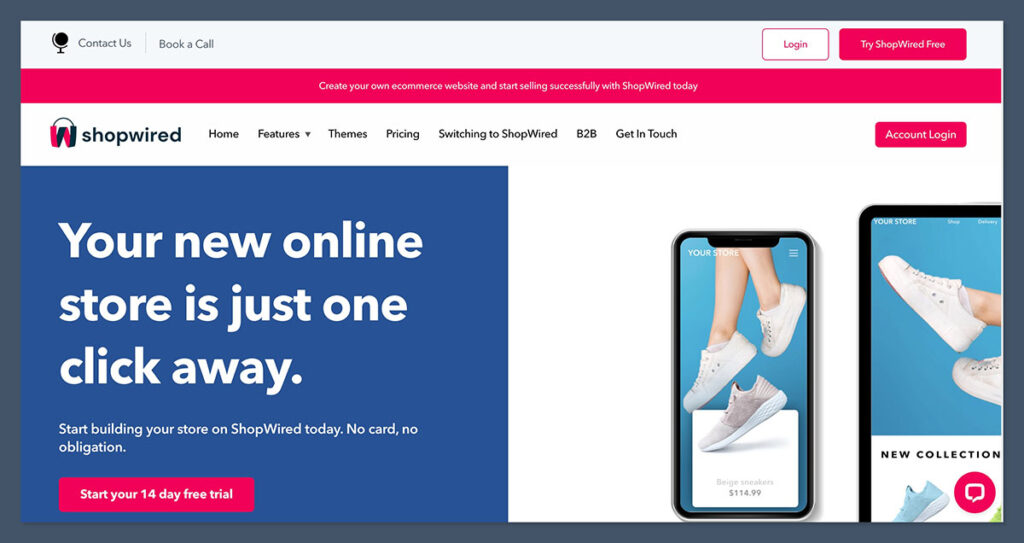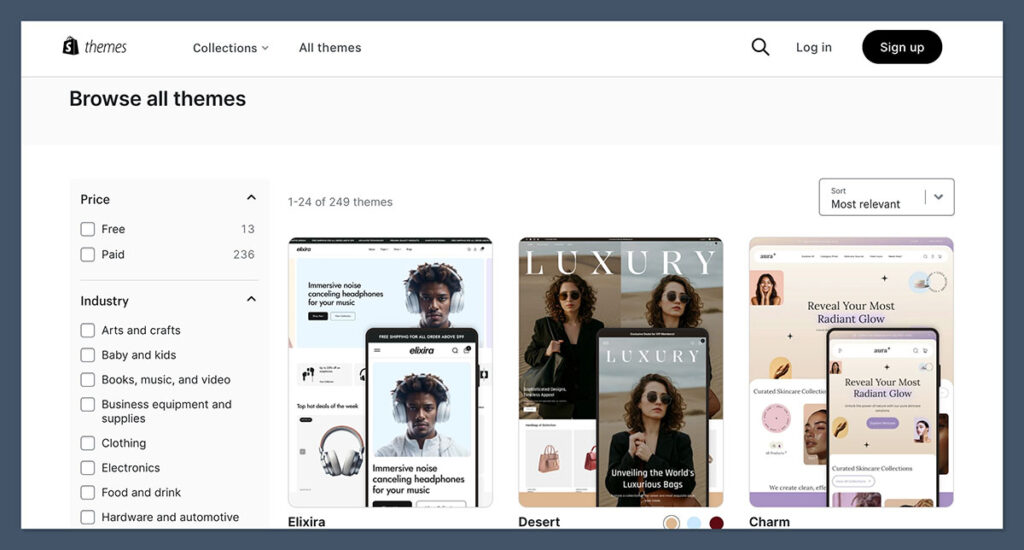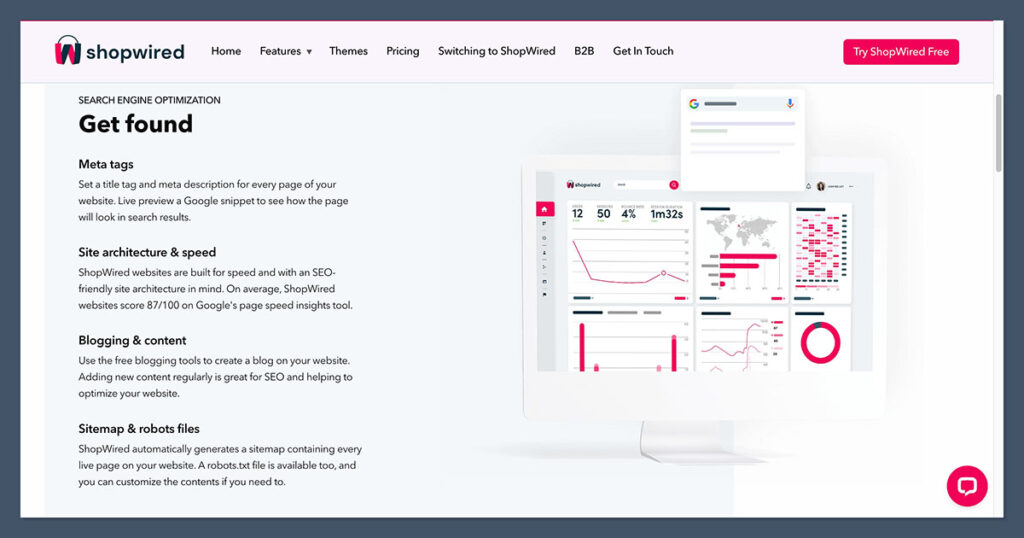Shopify and ShopWired are two strong ecommerce website builders, but which comes out on top?
After over 40 hours of testing and reviewing both platforms, I’ve found that Shopify is the better choice for global growth and advanced selling tools, while ShopWired wins for UK-based businesses that want a more cost-predictable, built-in approach.
Shopify vs ShopWired: Quick Verdict
- Shopify – Best overall for growing stores and global selling
- ShopWired – Best for UK sellers who want built-in features and no transaction fees
Quick Comparison: Shopify vs ShopWired
Here’s a side-by-side look at their key differences:
| Feature | Shopify | ShopWired |
|---|---|---|
| Founded | 2006 (Canada) | 2013 (UK) |
| Live Stores | 4.8M+ worldwide | 10K+ (mostly UK) |
| Pricing (USD) | $39 – $399/month (Plus from $2,000) | $38 – $140/month (Enterprise from $635) |
| Transaction Fees | 0.5% – 2% unless using Shopify Payments | None |
| App Ecosystem | 8,000+ | Smaller, but more features built in |
| Support | 24/7 live chat + phone (Plus only) | UK-based support, 24/7 live chat |
| Target Audience | Global sellers, scaling brands | UK-based small to mid-sized businesses |
Best for Pricing: ShopWired


If you want the best value, ShopWired comes out ahead for most UK-based merchants.
While Shopify’s entry plan is slightly cheaper at $39/month compared to ShopWired’s $38/month, transaction fees and paid app costs can make Shopify more expensive long-term.
Shopify pricing (USD, billed monthly):
- Basic – $39/month + 2% transaction fee (unless using Shopify Payments)
- Shopify – $105/month + 1% transaction fee
- Advanced – $399/month + 0.5% transaction fee
- Shopify Plus – From $2,000/month (negotiated rates)
ShopWired pricing (USD, billed monthly, no transaction fees):
- Pro – $38/month (£29.95)
- Advanced – $76/month (£59.95)
- Premium – $140/month (£109.95)
- Enterprise – From $635/month (£500)
The Winner: ShopWired. Its lack of transaction fees and built-in tools make costs more predictable, especially for high-volume sellers.
Best for Sales Features: Shopify


In my testing, Shopify offered the most complete set of sales features for global merchants.
Both platforms support unlimited products, abandoned cart recovery, discount codes, and multiple payment methods, but Shopify pulls ahead with its global selling infrastructure.
Shopify standout sales tools:
- 100+ payment gateways, including Apple Pay, Google Pay, and PayPal
- Shopify Markets for international selling (multi-currency, multi-language)
- AI-powered product description generator (Shopify Magic)
- Deep integrations with marketplaces like Amazon, eBay, and social platforms like TikTok and Instagram
ShopWired standout sales tools:
- Built-in wholesale/B2B tools at no extra cost
- VAT and tax calculation built in for UK compliance
- Royal Mail, DPD, and DHL shipping integrations out of the box
- One-page checkout option for faster conversions
The Winner: Shopify for global reach, ShopWired for UK-specific selling.
Best for Templates: Shopify


A well-designed theme can make your products look more appealing, guide visitors smoothly through the buying process, and help establish brand credibility from the first click.
Both Shopify and ShopWired understand this, but they take different approaches to template variety and customization.
Design matters, and Shopify offers more choice and better industry-specific templates.
Shopify templates:
- 190+ total (13 free, rest $100–$500 one-time)
- Modern, responsive, and industry-focused designs
- Customization via Shopify’s Theme Editor and Liquid code
ShopWired templates:
- 30+ templates (most free)
- Mobile responsive and easy to edit without coding
- Smaller selection compared to Shopify’s extensive theme store
The Winner: Shopify. Its larger library and industry variety give more flexibility for branding.
Best for Ease of Use: ShopWired
Ease of use can be the deciding factor for many business owners, especially if you’re not particularly tech-savvy. An ecommerce platform might be packed with features, but if you struggle to navigate the dashboard or make simple changes, it can slow you down and cause unnecessary frustration.
In my testing, ShopWired’s dashboard felt simpler and more intuitive for new store owners. Shopify’s onboarding is sleek, but customizing themes beyond the basics often requires apps or Liquid code.
Shopify onboarding:
- Quick sign-up and business setup questions
- Section-based editor (not drag-and-drop)
- Can feel overwhelming due to the sheer number of apps and settings
ShopWired onboarding:
- Simple setup with fewer steps
- Visual theme editor without coding
- Fewer apps, more built-in tools mean less complexity
The Winner: ShopWired for beginners, Shopify for those comfortable with customization.
Best for SEO: ShopWired


While both Shopify and ShopWired include essential SEO features, the way they handle technical performance and customization options can have a noticeable impact on rankings, especially in competitive niches.
Both platforms provide standard SEO features — editable meta tags, alt text, and sitemaps — but ShopWired’s clean URL structure and faster load speeds give it an edge in technical SEO.
Speed testing results (UK servers, 2025):
- Shopify average load time: 2.7 seconds
- ShopWired average load time: 1.9 seconds
The Winner: ShopWired for technical SEO performance, Shopify for integrated SEO apps and content marketing.
Best for Customer Support: Tie
Customer support is one of those things you hope you won’t need often, but when you do, it can make or break your experience. Whether it’s troubleshooting a checkout issue or getting help with integrations, quick and reliable support can save you time and protect your sales.
Both platforms provide 24/7 support, but the style differs.
Shopify:
- 24/7 live chat assistant, escalation to human agents
- Phone support for Plus customers
- Large help center, video tutorials, and community forums
ShopWired:
- UK-based phone and email support
- 24/7 live chat with local agents
- Help guides tailored to UK ecommerce laws and shipping
The Winner: Tie — choose based on whether you want global or local expertise.
Shopify vs ShopWired: Final Verdict
If your business is UK-focused and you want predictable pricing, built-in features, and faster load times, ShopWired is the smarter choice.
If you’re aiming to scale internationally, manage a complex inventory, and sell across multiple channels, Shopify wins.
| Best for… | Winner |
|---|---|
| Pricing | ShopWired |
| Sales Features | Shopify |
| Templates | Shopify |
| Ease of Use | ShopWired |
| SEO | ShopWired |
| Customer Support | Tie |
| Global Selling | Shopify |
Both Shopify and ShopWired are capable, reliable ecommerce platforms — but they shine in different situations.
The right choice depends on your selling strategy, your target market, and how much control you want over costs and customization.
Shopify offers unmatched scalability and global selling tools, making it ideal for ambitious brands with international aspirations.
ShopWired focuses on simplicity, built-in functionality, and UK-specific support, making it a strong option for merchants who value efficiency and predictable expenses.
If possible, test both with their free trials before committing so you can experience their workflows firsthand.





